
At Applied, we set out to build a fair, predictive hiring platform. The first thing we did was rethink how and when we use CVs. Here’s why YOU should do the same...
CVs have been knocking about since the 50’s.
And behavioural science has come a long way since then.
We no longer communicate via telegraph.
We don’t work on typewriters anymore.
But the way we screen candidates has remained largely unchanged.
Very much unlike a fine wine, they’re NOT getting better with age.
Our case for rethinking the CV is pretty simple really: CVs are biased and they’re not predictive of skills.
You might feel like a lost, dummy-less infant without CVs to rely on.
But, isn’t it about time we severed ties with a primitive hiring method that doesn’t do candidates OR employers any justice?
So fasten your seatbelt and hold on tight, here’s why you should change the way you review CVs.
Exhibit A: CVs have been proven to invite bias
Are personal details actually necessary?
CVs allow reviewers to discriminate against candidates, both consciously and unconsciously.
Maybe without even knowing it, you make snap judgments based on information like:
- Gender
- Age
- Name
- Home address
The truth is, details on a CV are used to find reasons to EXCLUDE candidates.
Dismissing people because they didn’t work at a big company you’ve heard of is bad.... very bad.
BUT, candidates are being overlooked because of details that have nothing to do with their experience or skills.
I know what you’re thinking: this sounds very pessimistic. However, this is the reality of what's happening.
When sending off a job application, women and people of minority races are less likely to be contacted, despite having the same qualifications as those with Caucasian and male names. (Carlsson & Rooth, 2007; Oreopoulos, 2009; Pager et al, 2009).
Research has shown that simply changing the name on an application can significantly alter call-back rates, even for employers with a public commitment to equal opportunity.
Experiments in the US, Canada and Australia which involved sending fake resumes to real employers reveal that the response rates to otherwise identical applications can be up to 50% higher for ‘white sounding’ names. In the UK, that figure is just over 75%.

Studies have also shown that even when organisations share explicit diversity statements on their job descriptions/website, this still doesn't result in any better outcomes.
In fact, it may even have the opposite effect.
A study from 2016 tested whether or not employers with pro-diversity language in their job ads showed any less recruitment bias.
Researchers found that when applying to an organisation that presents itself as valuing diversity, minority background candidates were less likely to ‘whiten’ their CV.
However, these diversity statements were not actually associated with reduced discrimination.
And so ethnic minority candidates were less likely to 'whiten' their CVs - resulting in more overall discrimination.
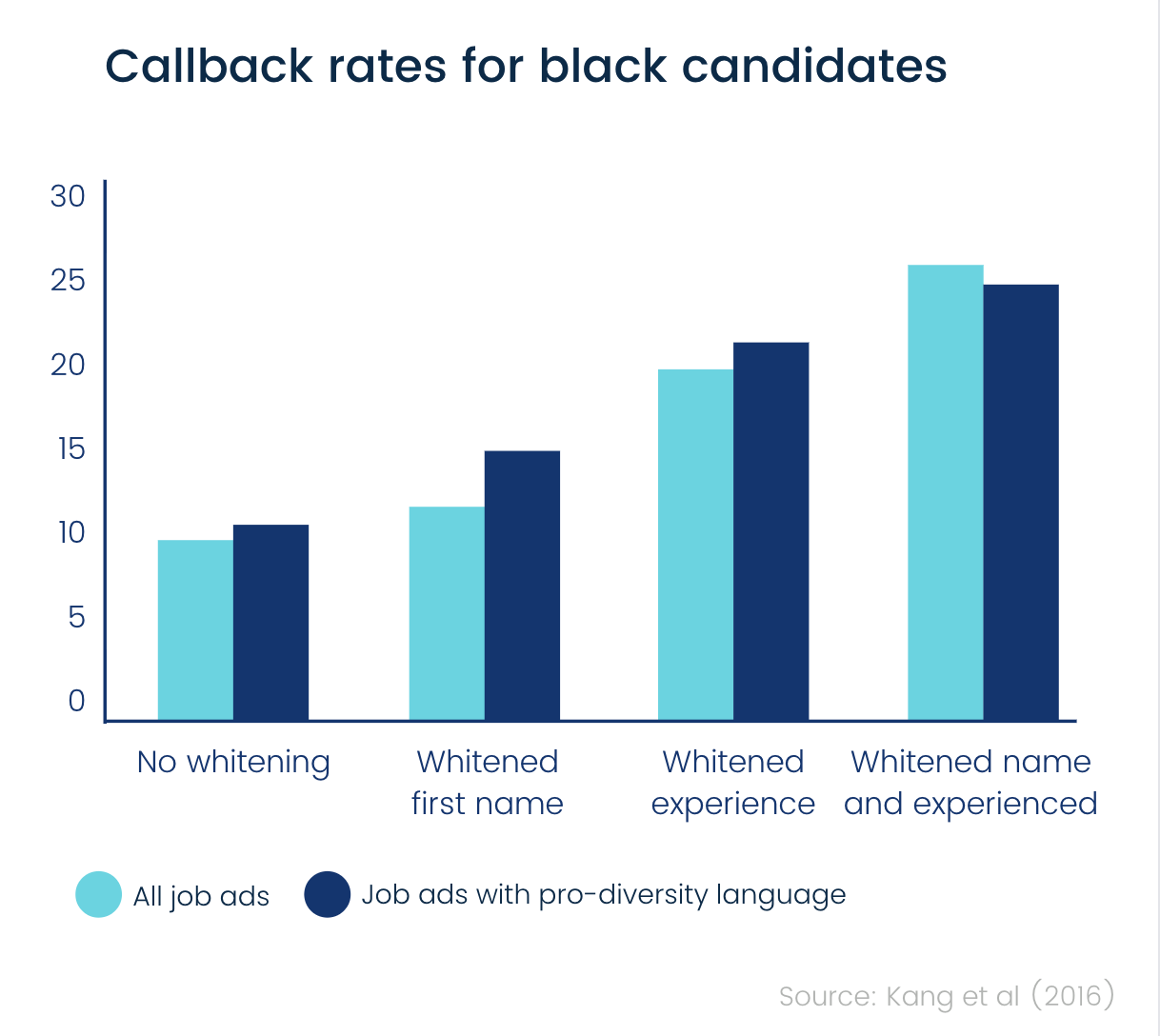
It isn't just ethnic minority candidates that face unfair discrimination, your gender can also dictate your chances of being hired.
A US study found that university science faculties perceived women as being less competent and hireable than their male candidates - despite all other factors being identical.
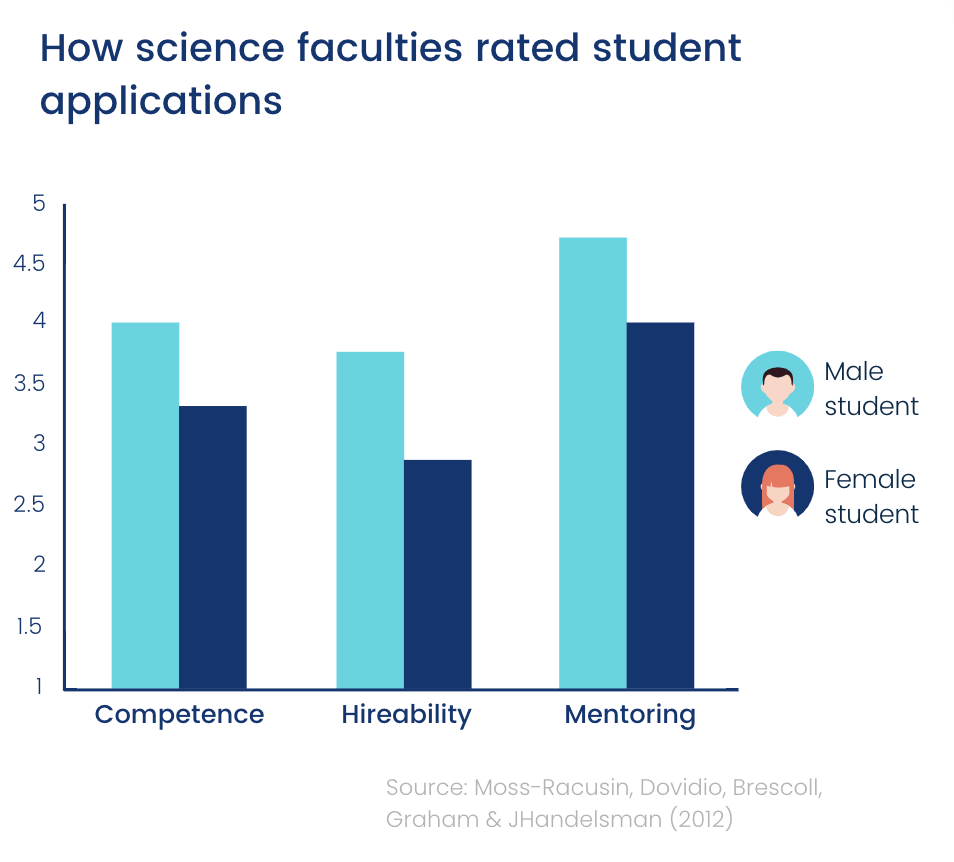
So why don’t we just blank out names, addresses and other identifying information on CVs?
Well, some companies are doing just that - manually blacking out personal details.
Think about that for a second… our current CV process is so broken that people are going to town on them with permanent markers.
Are you snobby about education and experience?
Bias isn’t just about discriminating based on physical differences, it comes in many forms. Here’s just a few kinds of bias that CVs perpetuate:
Affinity bias: the tendency to like people who are similar to us or remind us of someone we like.
Maybe a candidate has a similar background to you, maybe they went to your university or held past roles like yours.
Confirmation bias: the tendency to search for, or interpret information that confirms one’s preconceptions.
You take a liking to a candidate and so you think everything they’re saying in their CV is spot on (whether it is or not).
Halo effect: describes how judgements about some aspects of an object may influence how other aspects of an object are judged.
Oh, this person went to Loughborough Uni and did a cool sounding degree, they must also be very good at their job too.
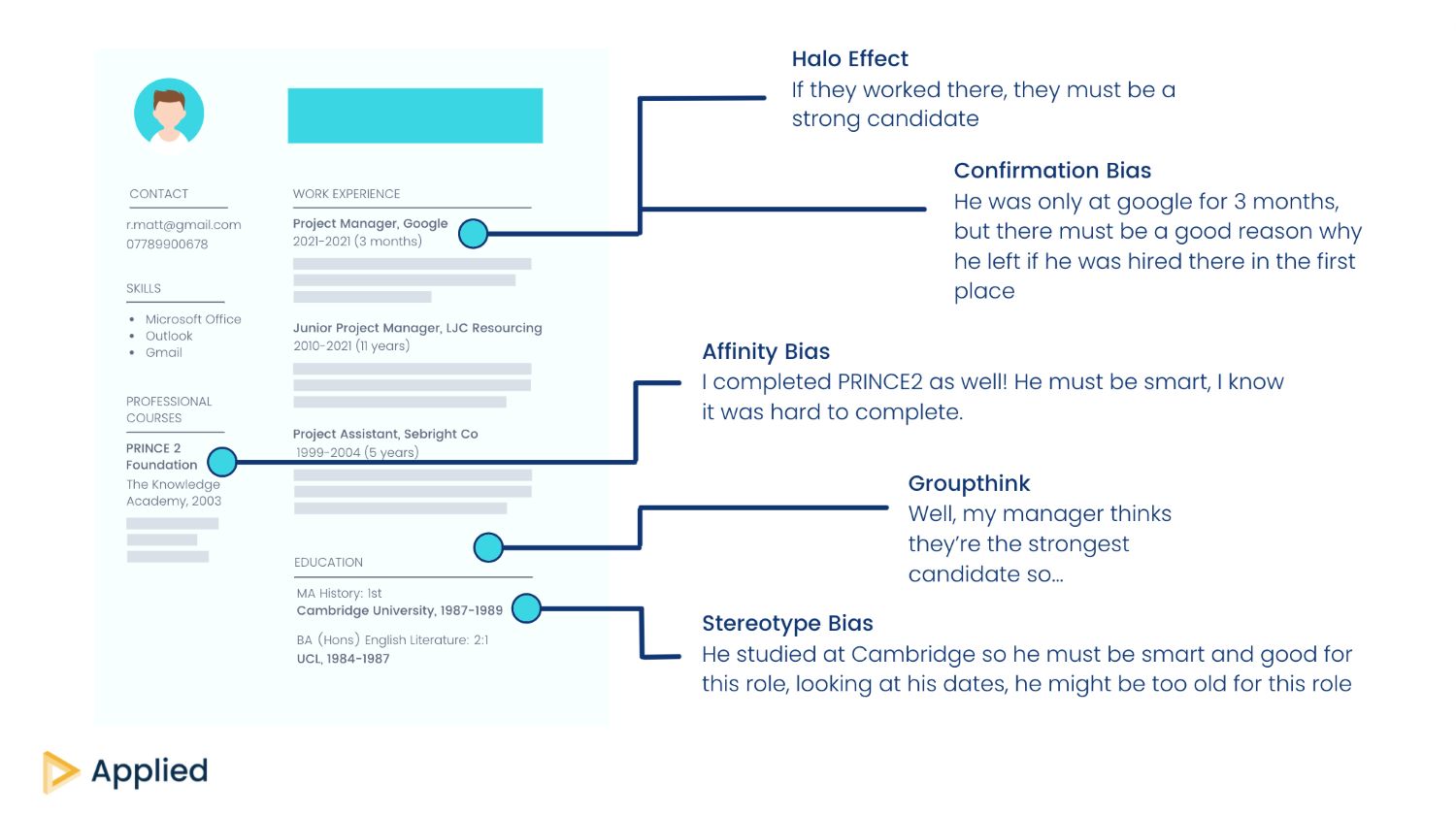
You might think you’re immune to these biases.
But chances are, if you're human, you're biased!
Why? Most of your biases are likely UNCONSCIOUS.
Think about this: the average time spent reviewing a CV is 7.4 seconds.
How long do you take to browse a menu at a new restaurant?
More than 7.4 seconds I bet?
Why are you spending longer choosing between the cheeseburger or fish and chips than reviewing applications for your new developer or salesperson?
Perhaps it’s because 7.4 measly seconds is all it takes to scan a CV for disqualifying information and move onto the next.

The order in which you look at CVs affects your judgment
It’s not just about the content on someone's CV. Even time itself can influence biases.
Even when using our own CV-less assessment method (more on that to come), we found that the order in which applications are assessed affected their ranking.
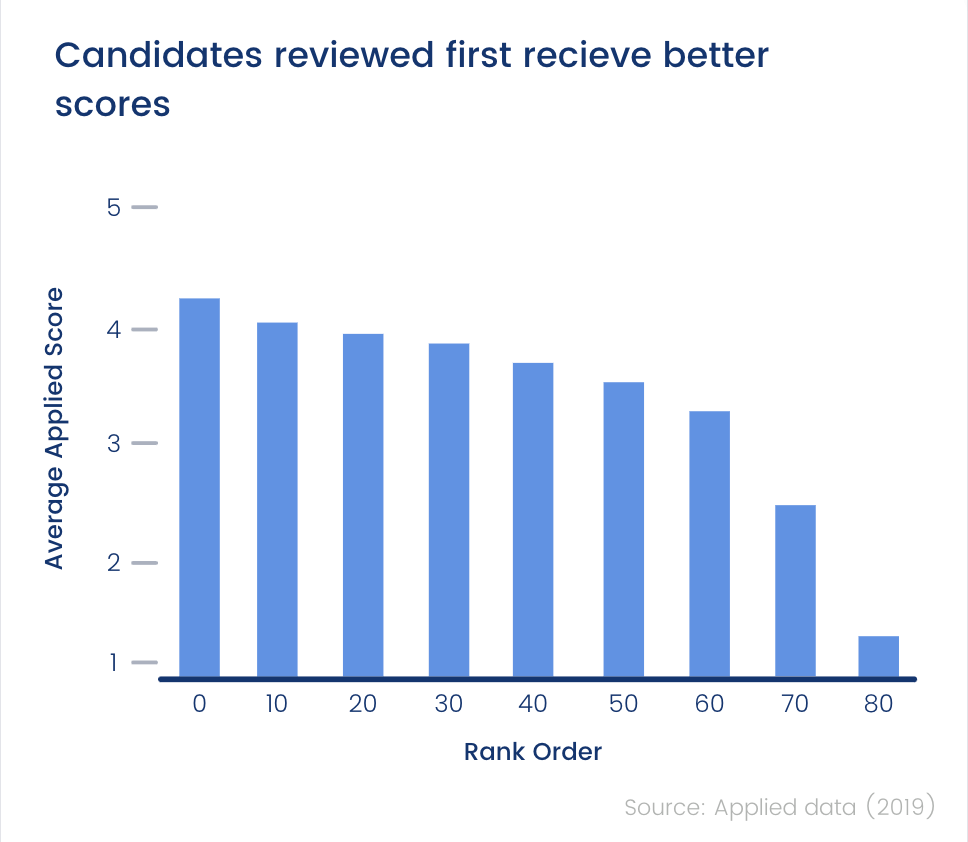
Candidates scored first performed better.
Psst... that’s why the Applied platform randomises the order in which applications are reviewed.
Exhibit B: CVs aren’t predictive of skills
In the words of former head of HR at Google Laszlo Bock, “It (the CV) doesn’t capture the whole person. At best, they tell you what someone has done in the past and not what they’re capable of doing in the future.”
And he’s right.
It’s a list of what you have already done. Not what you can do.
In a nutshell, this is why CVs aren’t predictive of future job performance.
Don’t believe us?
Take a long, hard look at these findings from Schmidtt & Hunter's landmark meta-study…
(The numbers along the bottom represent the predictive power of each assessment method).
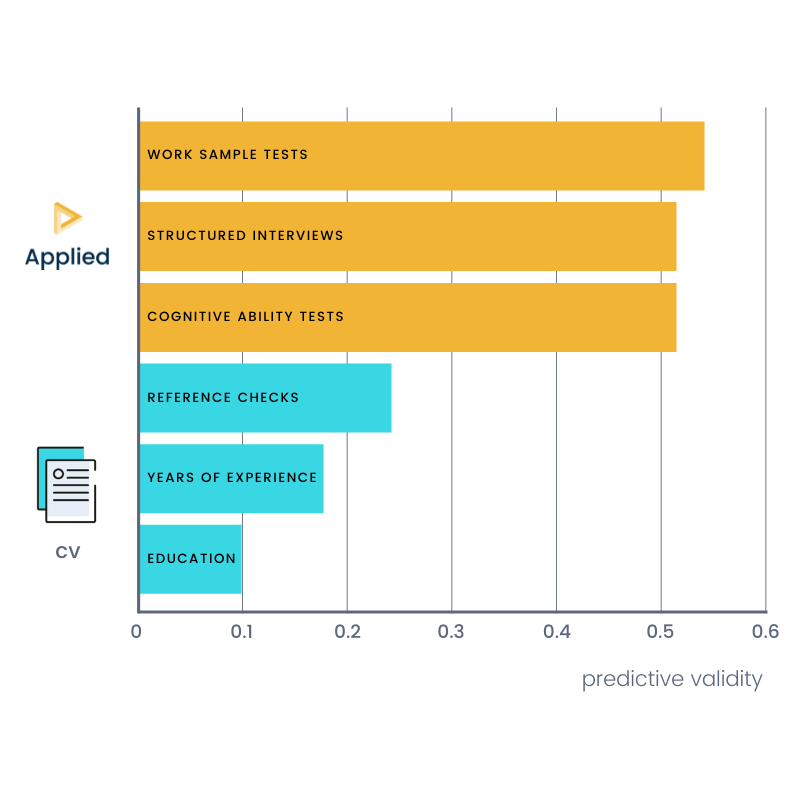
Predictive validity is a measure of accuracy used in science and psychology.
It's a way of determining how well a given test or assessment can predict future outcomes.
Predictive validity studies can take years to complete, but the meta-study above gives us an overview of 100+ years of research.
The results are clear: education and experience aren't very accurate at telling us who will perform best, should they get the job.
How do you know candidates are even telling the truth?
Ladies and gentleman of the jury…
If all of the above has not convinced you to start feeding CVs to shredders, consider this...
People lie on their CV.
...most people.
According to HireRight's 2017 employment screening benchmark report, 85% of employers caught applicants lying on their CVs.
Is everything on your CV is 100% true?
No exaggeration?
Even a little?
Maybe you're a squeaky-clean saint, who would never tell a porkie or even entertain the thought of overstating their involvement in an important sounding project.
But if you’re a mere mortal like the rest of us, you’ve probably given yourself a little undeserved sprinkle of credit somewhere on your CV.
Verdict: GUILTY! CVs aren’t fair or effective
Here’s a little nugget of data for you to bear in mind: top 1% employees perform 25x better.
And whilst I’m sure you’re a smart cookie (you’re reading this article after all), chances are you’re not psychic.
Although you might think you have a knack for spotting those top 1%, golden candidates, the data suggests otherwise.
CVs can’t tell you who the best person for the job is.
Because they’re not asking the right questions.
The evidence is clear - we’re using a broken method to make vital, costly business decisions!
Lot’s of companies are now spending eye-watering amounts of money addressing their diversity (or lack thereof). Google alone spent $114 million on diversity-related programs back in 2014.
However, unconscious bias training doesn’t work.
The system is broken. We have to change the system, not put a plaster on it.
Rather than train people how to navigate the broken system, would it not be more effective to change the system itself?
If you're using CVs - anonymisation is essential
Despite the overwhelming volume of evidence, there is still a debate around how useful past experience and education are (old habits die hard).
However, there's little debate that things like names, photos and addresses provide any real insight into someone's skillset.
So no matter how you choose to screen candidates, these details should be anonymised - whether that's using a platform like ours or the old fashioned way with a marker pen.
Anonymisation works and costs nothing.
Back in the 70s and 80s, orchestras were able to double the number of women making it through auditions just by doing them from behind a curtain.
Whether you're ready to let go of CVs or not, anonymisation of irrelevant background information is critical if you want to hire people from a wider range of backgrounds.
Is there a fairer way to use CVs without ditching them entirely?
If your bin isn’t brimming with CVs yet, we understand.
Letting go isn’t easy.
Although CVs are far from ideal, there may times you feel they're a necessary evil.
You might be hiring for a role far beyond your expertise, or just in need of that extra safety net.
If this is you, then we'd recommend trying a 'structured CV sift'.
Instead of glancing over CVs until something catches your eye, structure your sifting by giving yourself a set list of questions to score candidates against.
By adding this layer of structure, you'll be forcing yourself to use a more conscious, effortful system of thinking - which will significantly reduce the opportunities for biases to creep in to your decision making.
Questions to ask yourself:
- Does this person's experience reflect the skills we're looking for?
- Have they been promoted in previous roles?
- Have they worked in a similar environment before? (e.g startup, nonprofit etc)
Whilst this isn't necessary the most predictive means of screening candidates, it will give you some basic data to make decisions with and likely mitigate at least some biases.
To make this process as ethical and data-driven as possible, we built our CV Scoring Tool. Quickly score candidates using our 'focus questions' to make more objective shortlisting decisions.
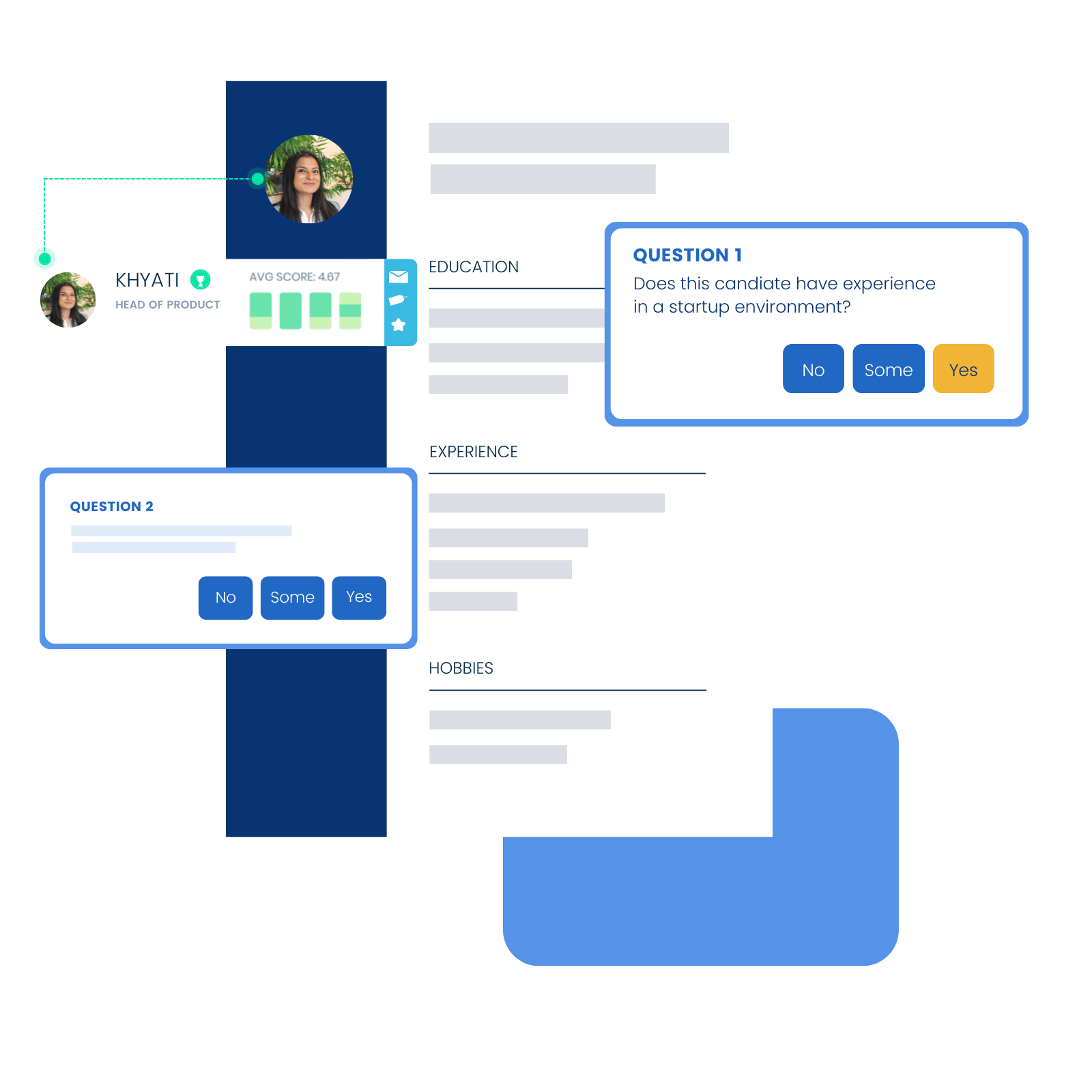
The fairer alternative to CVs: work sample questions
You want the best person for the job. Not the candidate that’s been to the ‘best’ uni or with the biggest company on their CV.
When we’re hiring new recruits to the Applied team, we don’t ask for CVs.
We haven’t seen a single one.
Our team come from all different backgrounds, and we haven’t had to let anyone go because of performance OR 'cultural fit’.
So if you’re not going to use CVs, what should you do instead?
Try using what we call ‘work sample questions’, or ‘sift questions’: job-specific questions that test candidates on the skills needed to succeed in the role.
Think of the skills you’d like your new hire to have. It’s best to go for a mix of general qualities (like creativity, communication, etc) and more job-specific, technical skills (like Excel or HTML).
Then come up with 4-5 questions to test those skills/ qualities. You can test multiple skills with one question.
For instance, when hiring for a new member of our sales team, we asked the following question to test candidates’ persuasion and research skills:
“We're in the process of reaching out to management consulting firms as part of this week's marketing campaign: Draft an email to the Head of HR, introducing Applied, and trying to arrange an introductory call.”
We strongly recommend giving yourself a scoring criteria for each question. So, what would a 5/5 answer be? What would a 1/5 answer be?

This way, you’re giving yourself clear guidelines for assessing applicants so you won’t be wooed by fancy words or technical jargon.
We don’t use this method for fun (although our candidates have reviewed us very highly). We use it because it’s the most PREDICTIVE.

Applied is the essential platform for fairer hiring. Purpose-built to make hiring ethical and predictive, our platform uses anonymised applications and skills-based assessments to improve diversity and identify the best talent.
Start transforming your hiring now: book in a demo or browse our ready-to-use, science-backed talent assessments.


.png)

.png)

